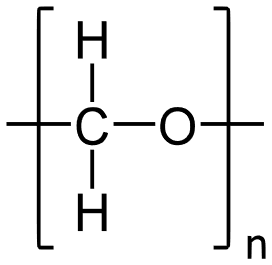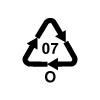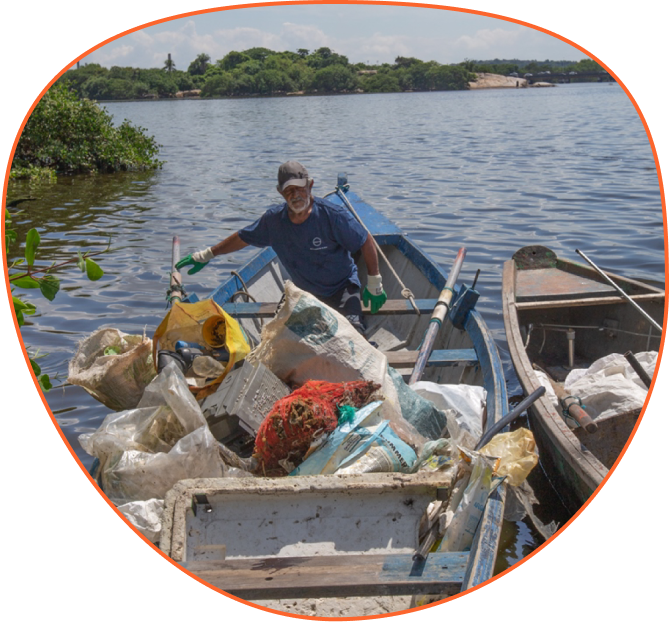POM (Polyoxymethelene)

Polyoxymethylene (POM) also known as acetal resin or polyformaldehyde is a crystalline thermoplastic polymer. It is used where excellent dimensional stability, low friction and high resistance are required. Repeating chains are composed of a methylene group and an oxygen atom. The material is very resistant with a relatively low cost. It has a very low friction coefficient and excellent thermal resistance.
Chemical formula POM: (CH2O)n
CAS Number POM: 9002-81-7
Chemical Name POM (IUPAC): poly(oxymethylene)
Recycling Code POM: number 7
Recycling Symbol POM: 
POM commercial names and producers:
- Bergaform (PolyOne)
- Celcon (Celanese)
- Delrin (DuPont)
- Duracon (Polyplastics)
- Formocon (Formosa Plastics)
- Heraform (Radici)
- Hostaform (Celanese)
- Isoform (Sirmax)
- Isotal (Sabic)
- Iupital (Mitsubishi)
- Kematal (Celanese)
- Kepital (KEP)
- Kocetal (Kolon)
- Latan (Lati)
- Lucel (LG Chemical)
- Polyform (Polykemi)
- Rialform (Rya-Polymers)
- Sabic POM (Sabic)
- Ultraform (BASF)
- Tarnoform (Azoty)
- Tenac (Asahi)
POM European Distributors:
- BIGLER (Kepital, Heraform)
- Schulman (Schulaform, Lucent, Accucomp)
- Mega Polymers (Celcon, Delrin, Hostafrom, Kepital, Tenac, Ultraform)
- Tekuma (Kepital)
- KD Feddersen (Hostaform)
- PolyOne (Delrin)
- ALBIS (Alcom, Ultraform)
- Biesterfield (Delrin)
- Nexeo (Electrafil, HiFill, InLube, Lubricomp, Lubriloy, Stat-kon, Thermocomp, Plaslube, Ultraform)
- RESINEX (Hostaform, Resinex POM)
- Ultrapolymers (Tenac-C, Ultraform, Latan, Latilub, Latiohm, Latishield, Latistat, Luvocom, Lubricomp, Lubriloy, Stat-kon, Stat-loy, Thermocomp, Kepital, Tenac,)
- TER Plastics (Duracon, Tarnoform)
Main compound POM:
- POM-GF30 (Polyoxymethelene with 30% fibre glass)
- POM with lubricant
Chemical and physical properties:
POM is used a lot for its excellent mechanical characteristics. It has an excellent creep resistance, low friction, and excellent performance at low temperatures. However, chemically it has some disadvantages such as easy combustion and the production of toxic fumes which consequently severely limit its field of use. POM is divided into two main categories, POM homo, and POM copo which differentiates itself from the former by the presence of groups –CH2CH2O–.
POM standard density: 1,35 - 1,44 g/cm3 (ISO 1183)
POM melting point Tm: 165 - 185 °C
POM glass transition temperature Tg: -50 °C
POM market applications
- gears
- precision mechanics
- screws
- plumbing
- piping
- zips
- electronics
- automotive
- medical
- construction
- clothing
- musical
POM transformation technologies
- Blow-molding,
- Compression molding
- Extrusion
- Injection molding
- Rotational molding
Disclaimer: Il contenuto di questo database è stato creato sulla base di informazioni di pubblico dominio ed è gestito da PlasticFinder srl. Le descrizioni contenute non offrono alcuna garanzia di completezza, attualità o accuratezza. Eventuali commenti o integrazioni possono essere inviate all'indirizzo e-mail: info@plasticfinder.it
PlasticFinder s.r.l. non verifica che gli utenti abbiano il diritto di disporre dei prodotti descritti nella scheda-prodotto, né la titolarità dei diritti di proprietà intellettuale e non è responsabile di eventuali violazioni di diritti di terzi.
| POM First choice - Virgin | POM MFI 9 NATURAL | granule/pellet | Natural / Neutral | 22500 Kg | bags on pallet | 1.79 €/Kg | |
| POM First choice - Virgin | MC90 | granule/pellet | Natural / Neutral | 27000 Kg | bags on pallet | 3.30 €/Kg | |
| POM First choice - Slow moving | KEPITAL F20-03 | granule/pellet | Natural / Neutral | 4500 Kg | bags on pallet | 1.98 €/Kg | |
| POM Recycled SRM /Regrinded / Industrial By-Product / Industrial compound | HOSTAFORM | regrinded | Miscellaneous | 20000 Kg | bigbag 1.000-1.100 kg | 0.80 €/Kg | |
| Polymer POM POM MFI 9 NATURAL | 22500 Kg | 1.79 €/Kg | |
| Polymer POM MC90 | 27000 Kg | 3.30 €/Kg | |
| Polymer POM KEPITAL F20-03 | 4500 Kg | 1.98 €/Kg | |
| Polymer POM HOSTAFORM | 20000 Kg | 0.80 €/Kg | |
Polymer List
Polimeri attualmente disponibili su PlasticFinder Wiki:
- ABS (Acrilonitrile Butadiene Stirene)
- Ecoallene
- HDPE (Polietilene ad alta densità)
- LDPE (Polietilene a bassa densità)
- PA6 (Poliammide 6, nylon 6)
- PA66 (Poliammide 66, nylon 6-6, nylon 6/6 o nylon 6,6)
- PA12 (Poliammide 12, nylon 12)
- PBT (Polibutilene Tereftalato)
- PC (Policarbonato)
- PET (Polietilen Tereftalato)
- PMMA (Polimetilmetacrilato)
- POM (Polimetilmetacrilato)
- PP (Polipropilene - Polipropene)
- PVC (Cloruro di Polivinile)



